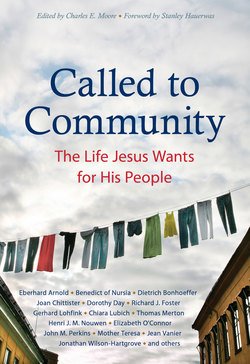Читать книгу Called to Community - Thomas Merton - Страница 9
На сайте Литреса книга снята с продажи.
Оглавление1
The Great Idea
◆ ◆ ◆ ◆ ◆
Fyodor Dostoyevsky
He had long been an official in the town; he was in a prominent position, respected by all, rich, and had a reputation for benevolence. He subscribed considerable sums to the almshouse and the orphan asylum; he was very charitable, too, in secret, a fact which only became known after his death. He was a man of about fifty, almost stern in appearance and not much given to conversation. He had been married about ten years and his wife, who was still young, had borne him three children. Well, I was sitting alone in my room the following evening, when my door suddenly opened and this gentleman walked in. . . .
And from that time forth he came to see me nearly every evening. And we should have become greater friends, if only he had ever talked of himself. But about himself he scarcely ever said a word, yet continually asked me about myself. In spite of that I became very fond of him and spoke with perfect frankness to him about all my feelings; “for,” thought I, “what need have I to know his secrets, since I can see without that that he is a good man. Moreover, though he is such a serious man and my senior, he comes to see a youngster like me and treats me as his equal.” And I learned a great deal that was profitable from him, for he was a man of lofty mind.
“That life is heaven,” he said to me suddenly, “that I have long been thinking about”; and all at once he added, “I think of nothing else indeed.” He looked at me and smiled. “I am more convinced of it than you are; I will tell you later why.”
I listened to him and thought that he evidently wanted to tell me something.
“Heaven,” he went on, “lies hidden within all of us – here it lies hidden in me now, and if I will it, it will be revealed to me tomorrow and for all time.”
I looked at him; he was speaking with great emotion and gazing mysteriously at me, as if he were questioning me.
“And that we are all responsible to all for all, apart from our own sins – you were quite right in thinking that, and it is wonderful how you could comprehend it in all its significance at once. And in very truth, so soon as people understand that, the kingdom of heaven will be for them not a dream, but a living reality.”
“And when,” I cried out to him bitterly, “when will that come to pass? And will it ever come to pass? Is not it simply a dream of ours?”
“What then, you don’t believe it,” he said. “You preach it and don’t believe it yourself. Believe me, this dream, as you call it, will come to pass without doubt; it will come, but not now, for every process has its law. It’s a spiritual, psychological process. To transform the world, to recreate it afresh, people must turn into another path psychologically. Until you have become really, in actual fact, a brother to everyone, brotherhood will not come to pass. No sort of scientific teaching, no kind of common interest, will ever teach people to share property and privileges with equal consideration for all. Everyone will think his share too small and they will be always envying, complaining, and attacking one another. You ask when it will come to pass; it will come to pass, but first we have to go through the period of isolation.”
“What do you mean by isolation?” I asked him.
“Why, the isolation that prevails everywhere, above all in our age – it has not fully developed, it has not reached its limit yet. For everyone strives to keep his individuality as apart as possible, wishes to secure the greatest possible fullness of life for himself; but meantime all his efforts result not in attaining fullness of life but self-destruction, for instead of self-realization he ends by arriving at complete solitude. All mankind in our age have split up into units; they all keep apart, each in his own groove; each one holds aloof, hides himself and hides what he has, from the rest, and he ends by being repelled by others and repelling them. He heaps up riches by himself and thinks, ‘How strong I am now and how secure,’ and in his madness he does not understand that the more he heaps up, the more he sinks into self-destructive impotence. For he is accustomed to rely upon himself alone and to cut himself off from the whole; he has trained himself not to believe in the help of others, in people and in humanity, and only trembles for fear he should lose his money and the privileges that he has won for himself. Everywhere in these days people have, in their mockery, ceased to understand that the true security is to be found in social solidarity rather than in isolated individual effort. But this terrible individualism must inevitably have an end, and all will suddenly understand how unnaturally they are separated from one another. It will be the spirit of the time, and people will marvel that they have sat so long in darkness without seeing the light. And then the sign of the Son of Man will be seen in the heavens. . . . But, until then, we must keep the banner flying. Sometimes even if he has to do it alone, and his conduct seems to be crazy, a man must set an example, and so draw people’s souls out of their solitude, and spur them to some act of brotherly love, that the great idea may not die.” ◆
